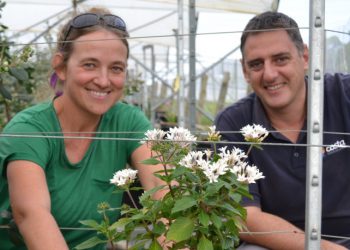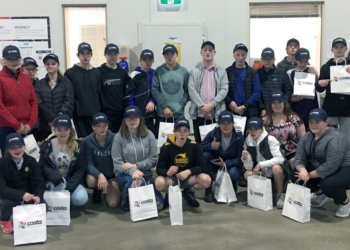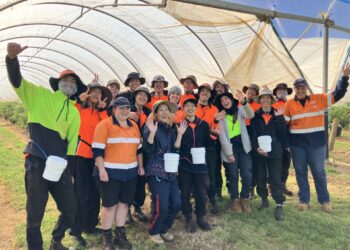Ensuring the health of native bees and honeybees and enhancing the pollination of crops is the aim of a partnership between Costa and bee researchers at the University of New England.
UNE and the team at Costa Berries in Corindi are part of the collaborative ‘Securing Pollination for More Productive Agriculture’ project that is investing more than $5 million to develop guidelines for effective pollinator management and stakeholder adoption.
Senior horticulturist at Costa, Maurizio Rocchetti, said bees played a critical role in all crop production and the ongoing research collaboration with UNE and other partners was vital to ensure bee health.
One activity conducted under the project focused on optimising pollination for a range of crops including blueberries, melon, mango and raspberries.
“We were interested in finding out more about honeybees and stingless bees in particular. We knew both species visited blueberry flowers on the farm, but we didn’t necessarily know if they were both efficient or if one was more so than the other,” said Dr Romina Rader, a Senior Lecturer in Community Ecology at UNE.
“We did lots of experimental work where we watched flowers for a long time and observed how many visits the different pollinators would make to the flowers.”
Dr Rader said the project also looked at how many wild bees were providing pollination.
“We found there were on average 25-125 stingless bee colonies per hectare, each with thousands of forager bees.”
Mr Rocchetti said new activities were now looking at how to support the bees.
“We want to see what sort of flowers we need to introduce on the farm in response to certain weather patterns or when there are no other flowers available,” he said.
“The crop itself is one type of pollen and bees need diverse pollen to have good colony health. This year particularly in
January and February when there were no flowers around, we saw the weight of the colonies of stingless bees going down.
“What we are trying to identify is management practices that can deliver better outcomes for growers, the environment and bee keepers.”
“We know that blueberry pollen doesn’t have a high protein content, which bees need for the brood. We are looking at providing some additional pollen sources to attract bees and help maintain strong hives.”
Dr Rader said the research was essentially about making sure the hives remained strong.
“All the things we are doing is to make sure the bees can work hard and stay happy year round – we are doing our best to make sure the bee populations stay healthy.”
She said another project has just begun looking at the use of flies in crop pollination. This project is co-funded by multiple partners in industry, government and research partners as part of Horticulture Innovation’s pollination plus program. It is being led by the Western Australian Department of Agriculture and Food.
“We are interested in finding out if flies can move blueberry pollen. Some flowers are more attractive to flies than to bees. Flies also tend to move quite sporadically, they don’t have a social colony to go back to. Their whole foraging behaviour is different to bees.” she said.
Flies that come out in colder temperatures than bees are the most predominant pollinator in alpine regions.
“It comes back to having the insurance of multiple species providing pollination services. There’s a bit of work to do. At this point we are just going to see if they are going to play a role and be efficient. Potentially it could be better for some crops,” Dr Rader said.
“What we are trying to identify is management practices that can deliver better outcomes for growers, the environment and bee keepers.”
The ‘Securing Pollination for More Productive Agriculture’ project is supported by funding from the Australian Government Department of Agriculture as part of its Rural R&D for Profit program.






